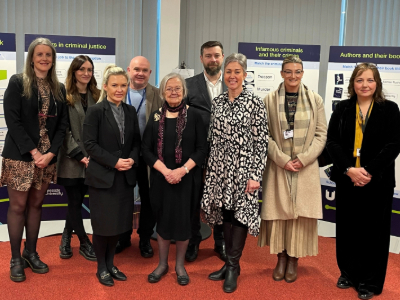Course overview
Aimed at those who have studied the foundations of legal knowledge (Contract Law, Criminal Law, Equity and Trusts, Retained European Union Law, Land Law, Public and Administrative Law and Tort) and are seeking to gain the more practical skills needed for a successful career as a solicitor.
Develop a sound knowledge and understanding of legal practice and its real-world application through the use of innovative and authentic learning, teaching and assessment methods. You are provided with the opportunity to gain real-life experiential learning and develop your practical skills in our award-winning Law Clinic.
This course includes all of the taught elements plus an extended research project.
Course details
Course structure
Core modules
Apply the knowledge and research skills developed throughout the course to a specific area of interest. You submit a 15,000-word project on an approved topic, for in-depth study and analysis. Initial taught sessions help you to identify an appropriate topic for the project, and an academic supervisor provides guidance and support throughout.
Gain practical experience offering pro bono advice to members of the Teesside community. Under the supervision of a qualified solicitor, work on live client cases involving family law, employment law or civil disputes, enabling you to develop practical legal skills and competencies. Your choice should reflect your chosen area of practice post-qualification. You may also work on other legal projects.
This module aligns with the Solicitors Regulation Authority assessment specification for the Solicitors Qualifying Examination 2. Apply fundamental legal rules and principles at the level required of a competent newly qualified solicitor, exploring client interview and attendance note/legal analysis, advocacy, case and matter analysis, and legal research, writing and drafting.
This module aligns with the Solicitors Regulation Authority assessment specification for Functioning Legal Knowledge 1 of the Solicitors Qualifying Examination 1. Apply relevant core legal principles and rules to realistic client-based and ethical problems and situations, exploring business law and practice, legal services and dispute resolution.
This module aligns with the Solicitors Regulation Authority assessment specification for Functioning Legal Knowledge 2 of the Solicitors Qualifying Examination 1. Apply relevant core legal principles and rules to realistic client-based and ethical problems and situations, exploring property practice, wills and the administration of estates, solicitors accounts and criminal practice.
Modules offered may vary.
How you learn
You are introduced to relevant legal concepts and principles through interactive lectures, workshops, computer laboratory sessions and smaller group seminars. You prepare for these sessions by actively researching (with increasing levels of autonomy) relevant materials for group discussion. You interpret and apply your research-informed knowledge to a variety of individual and group tasks, including group debates about contentious issues, problem-based exercises, real-world learning situations, reflective activities, multiple choice best answer questions, and self-directed research projects.
Learning is supported by the use of digital technologies (Blackboard Ultra, ReView/Panopto and our Future Facing Learning toolkit) ensuring you are digitally empowered, future-ready and globally connected.
How you are assessed
Your progress is measured by both formative and summative assessments.
Formative assessments support your learning. Feedback is provided to help you prepare for summative assessments.
Summative assessments are assessed and graded, which counts towards your degree award. You receive feedback on these assessments and you should consider how that feedback can help you with other work you complete.
The assessment strategy has been designed to mirror, as closely as possible, the assessment you must carry out as part of the Solicitors Qualifying Exams (SQE1 and SQE2).
Key assessment methods include:
- digital and live presentations (group and individual, with and without appropriate aids
- examinations based on multiple choice best answer questions in preparation for SQE1.
- multiple choice best answer questions
- multi-phased assessments
- personal and group reflections
- personal development plans
- problem solving tasks of increasing complexity
- self-directed research project
- short answer responses to ethical problems arising in a professional context.
Entry requirements
You must have an LL.B. at 2.1 or above or an equivalent law conversion course. We will consider applications from those with an LL.B. at 2.2, on a case by case basis. Applicants must be able to evidence successful completion of the foundations of legal knowledge of the English Legal System (Contract Law, Criminal Law, Equity and Trusts, Retained European Union Law, Land Law, Public and Administrative Law and Tort).
For general information please see our overview of entry requirements
International applicants can find out what qualifications they need by visiting Your Country
Employability
Career opportunities
You are equipped with the relevant knowledge and skills to progress to the Solicitors Qualifying Exams.
In addition to the recognised subject-specific knowledge, you develop understanding, cognitive, intellectual, practical, professional and generic key skills and qualities. These have a direct beneficial effect on future employability, in the legal profession or in subject-related disciplines, including academia.
Information for international applicants
Qualifications
International applicants - find out what qualifications you need by selecting your country below.
Select your country:
Useful information
Visit our international pages for useful information for non-UK students and applicants.


